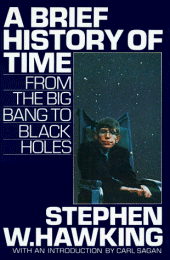Professor Stephen Hawking was diagnosed with ALS, better known as Lou Gehrig's disease, at age 21. This muscular disease caused him to rely on a wheelchair to get around and a voice synthesizer to speak. Regardless, his work on Black Holes, Singularities, the Big Bang, and many other subjects in the fields of physics and cosmology has turned him into an international celebrity. His name can be found in the history books of science alongside Albert Einstein and Isaac Newton. With a great sense of humor and a talent for explaining complex concepts in everyday English, he has expanded the minds and understanding of millions of people across the globe.
From "A Brief History of Time"
Hubble’s observations suggested that there was a time, called the big bang, when the universe was infinitesimally small and infinitely dense. Under such conditions all the laws of science, and therefore all ability to predict the future, would break down. If there were events earlier than this time, then they could not affect what happens at the present time. Their existence can be ignored because it would have no observational consequences. One may say that time had a beginning at the big bang, in the sense that earlier times simply would not be defined. It should be emphasized that this beginning in time is very different from those that had been considered previously. In an unchanging universe a beginning in time is something that has to be imposed by some being outside the universe; there is no physical necessity for a beginning. One can imagine that God created the universe at literally any time in the past. On the other hand, if the universe is expanding, there may be physical reasons why there had to be a beginning. One could still imagine that God created the universe at the instant of the big bang, or even afterwards in just such a way as to make it look as though there had been a big bang, but it would be meaningless to suppose that it was created before the big bang. An expanding universe does not preclude a creator, but it does place limits on when he might have carried out his job!